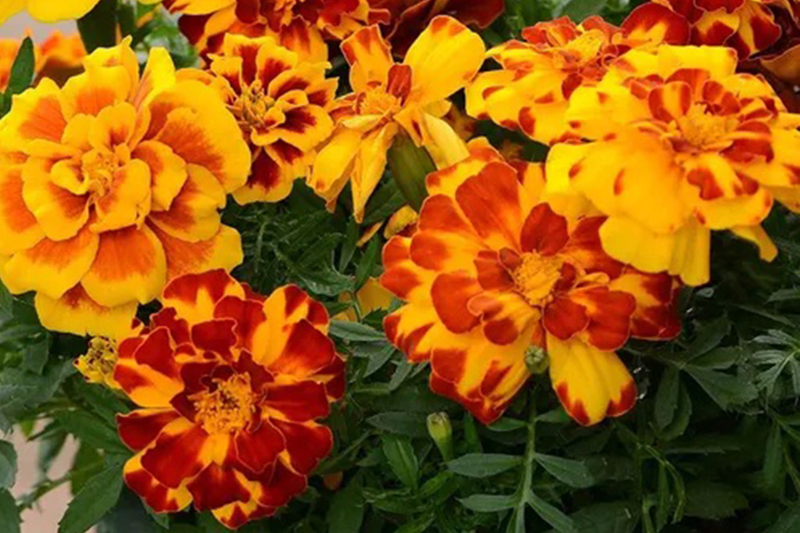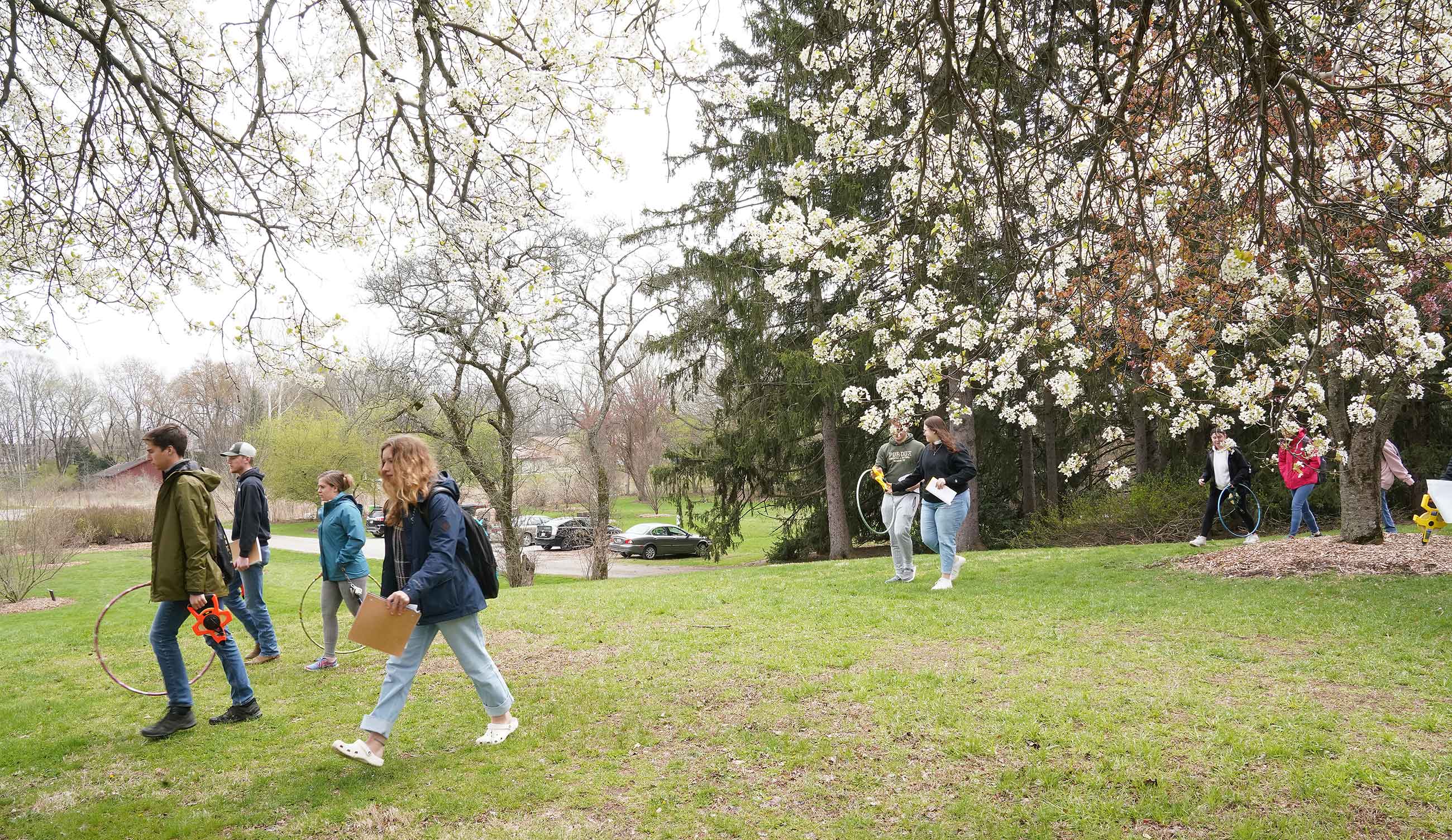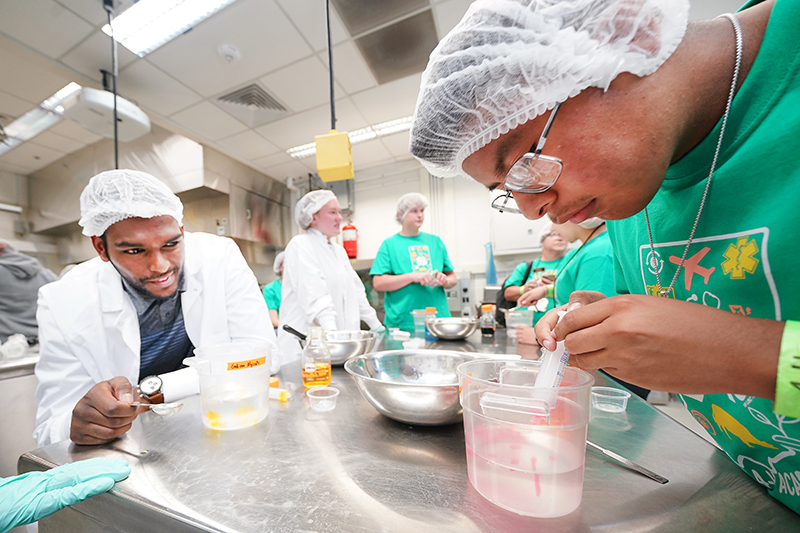Wells County
The Cooperative Extension Service is one of the nation's largest providers of scientific research-based information and education. It's a network of colleges, universities, and the U.S. Department of Agriculture, serving communities and counties across America. The Purdue University Cooperative Extension Service program areas are:
Agriculture and Natural Resources
Health and Human Sciences
Community Development
4-H Youth Development
Purdue Extension is a service tailored to meet the needs of Indiana, needs we know firsthand. Our educators, specialists, and volunteers live and work in all 92 Indiana counties. We provide the link between Land Grant research and Indiana citizens. In doing that we provide practical solutions to local issues. We provide information and expertise that's available in the form you want, when you want it. That's Purdue Extension, Indiana's home team advantage.
What We Do
We improve lives and livelihoods by delivering tested and trusted educational resources. The Cooperative Extension Service is one of the nation's largest providers of scientific research-based information and education. It's a network of colleges, universities, and the U.S. Department of Agriculture, serving communities and counties across America. The Purdue Extension focuses on: Agriculture and Natural Resources, Human and Health Sciences, Economic and Community Development and 4-H Youth.
Contact Us
Purdue Wells County Extension
horan@purdue.edu
1240 4-H Park Road
Bluffton, IN 46714
(260) 824-6412
2024 Wells County 4-H Rule Book
Check out the 2024 Wells County 4-H Rule Book for updated information about your 4-H projects.
2024 Wells County 4-H Rule BookServSafe Classes Offered
For more information and a list of available trainings and exams in our area visit the Purdue ServSafe link below.
Learn More HereWells County Newsletters
Check out Health and Human Science Newsletters with helpful articles on health, nutrition, family and finances.
The May/June 2024 edition includes the following articles:
How to Protect Yourself and
Your Family From the Sun
Exposure to ultraviolet (UV) light can be harmful to your skin. In fact, most skin cancers are caused by too much exposure to UV light. UV light mainly comes from the sun. But harmful UV light can also come from tanning beds and sun lamps. There are things you can do to help reduce exposure to UV light—for yourself and your children.
Children need special attention to keep them protected from the sun. They usually spend more time outdoors and burn more easily. Babies younger than 6 months old should be kept out of direct sunlight. They should also wear hats and protective clothing. Sunscreen used on babies should only be put on small areas of exposed skin.
Stay in the Shade
Staying in the shade is one of the best ways to help prevent UV exposure. Try to stay out of direct sunlight between 10 a.m. and 4 p.m., when UV light is strongest.
Tip: Use the shadow test to see how strong the sun’s rays are. If your shadow is shorter than you are, the sun’s rays are the strongest. Be sure to protect yourself.
Wear clothes to cover your skin
Long-sleeved shirts, long pants, or long skirts cover the most skin and are the most protective. Some clothing is made with UV protection.
Use sunscreen and apply it correctly
Sunscreen can help protect your skin from the sun’s UV rays. Use products with broad-spectrum protection (against both UVA and UVB rays). And choose a sunscreen with a sun protection factor (SPF) of 30 or higher.
Be sure to check the expiration date. Sunscreen is usually good for 2 to 3 years. And don’t forget to protect your lips by using a lip balm with sunscreen.
Sunscreen needs to be put on at least every 2 hours, but check the label just to be sure. Sunscreen can wash off when you sweat or swim and wipe off with a towel. So, sunscreen may need to be reapplied more often, even if it is “water resistant.”
Tip: Use at least 1 ounce of sunscreen (about a shot glass or enough to fill the palm of your hand) to cover your arms, legs, neck, and face.
It’s important to remember that sunscreen is just a filter. It does not block all UV rays. Use it, but take other steps to protect yourself, too.
Wear a wide brim hat
Be sure that your hat protects the eyes, forehead, nose, scalp, and ears. A hat with a 2 or 3-inch brim all around is best.
Wear sunglasses that block both UVA and UVB rays
Large-framed and wraparound sunglasses protect best. Children need smaller versions of protective adult sunglasses—do not use toy sunglasses.
Avoid tanning beds and sun lamps
Tanning devices can cause long-term skin damage and increase your risk of skin cancer.
Even with sunscreen, you should limit the amount of time you spend in the sun. Sunscreen does not block all UV rays.
Source: American Cancer Society
ServSafe Classes Offered
Purdue Cooperative Extension Service will be offering Retail Food Certificationclasses for food handlers who need to obtain a Retail Food Certificate.
Cost for this training is:
- Training, Exam, and Manual—$165
- Training and Exam—$115
- Exam With Manual—$115
- Exam Only—$65
May 22, 2024
1-day Training/Exam
Life Church Café of Hope
900 E State Street
Huntington, IN 46750
8:30 AM—4:00 PM
Exam at 4:00 PM
Register at: https://cvent.me/1dyOXq
August 13 & 20, 2024
Wells County Community Center
1240 4-H Park Road
Bluffton, IN 46714
1-day Training—August 13
8:30 AM—4:00 PM
Exam—August 20
9:00 AM
Register at: https://cvent.me/r8w1k2
The Outdoors and Nature
Spending time in nature is linked to many positive mental health outcomes—improved focus, lower stress, better mood, and reduced risk of developing a mental health condition. Most studies on nature and well-being look at green spaces like parks and forests, but researchers are also beginning to look at blue spaces—places with ocean and river views. However, you don’t need a picture-perfect outdoor experience to get the benefits of nature.
Plants and Green Space
Seventy percent of respondents to a Mental Health America Connection Survey reported wishing they had more time outdoors, ideally in nature away from their neighborhoods. Cities often have more stressors to physical and mental health, but green space (like parks and gardens) can reduce their impact. Even spending some time in your backyard (if you have one) can produce positive outcomes, and feeling connected to nature helps your mood even if you don’t spend time outdoors.
Children living in neighborhoods with more green space had a reduced risk of developing depression, mood disorders, schizophrenia, eating disorders, and substance use disorder.
Even being in the presence of indoor plants is worthwhile—studies have found this to improve focus, memory, and stress tolerance.
What Can I Do To Find Green Space?
Don’t discount the little things. While being in the wilderness is especially nice, even city parks, a small garden, or sitting under a tree can support your mental health.
Bring the outdoors in. Adding greenery to your space can have a similar effect to seeing plants outdoors – and some, like snake plants and bamboo palms, can purify your air.
Natural Light
Sunlight triggers the release of serotonin and vitamin D, which are associated with boosting mood and focus and reducing stress. Without enough sun, these levels can drop, leading to symptoms of depression, anxiety, and other mental health challenges. Light exposure also has a direct impact on your body’s sleep-wake cycle, and consistent sleep is one of the most important factors in your well-being.
More time spent in outdoor light is associated with lower odds of using antidepressant medications and fewer symptoms of insomnia. The natural lighting of a home is known to impact how you describe your own mood. Improvements to natural lighting have a positive impact on overall emotional social well-being, particularly among women and younger populations.
What Can I Do To Get Natural Light?
Enjoy the sunshine. Just 10-15 minutes of sun on your arms and legs a few times a week has the
potential to generate all the vitamin D you need; however, this depends on factors like the season, time of day, pollution, skin tone, and more.
Try a light box. Light therapy can help with symptoms of depression and sleep disorders. The bright light from a light box mimics natural sunlight, causing the brain to produce serotonin and regulate your internal clock.
Connection
One of the greatest benefits you get from nature is connection, which is linked to a better connection to self, community, and purpose. Time in nature benefits personal growth, self-esteem, emotional regulation, and social skills. When children connect with nature, they’re more imaginative and independent, and they feel more connected to the peers they’re playing with and other living things.
Accessible nature in a neighborhood, such as parks, lakes, or gardens, are associated with an increased sense of community belonging. People who reported not feeling connected to nature also didn’t feel connected to themselves, to others, or to spirituality/purpose. (MHA’s Connection Survey)
What Can I Do To Connect?
Practice gratitude. Nature is everywhere – even in cities, you can find places like community gardens, little courtyards, or trees full of birds and squirrels. Once you start tuning into your senses and appreciating the unexpected, it often feels more meaningful.
Plant something. Gardening is a great mindfulness activity. Getting your hands in the dirt can help you feel more grounded, and helping a plant grow can even boost your self-esteem.
Source: Mental Health America
2024 Wells County Extension Homemakers Festival
May 16, 2024
Registration will begin at 5:30 PM
Event begins at 6:00 PM
Registration forms were mailed toExtension Homemaker Presidents in April and are also available through The Wells County Extension Office.
Cultural Arts Exhibit:
Guidelines for the Cultural Art Exhibit are as follows:
- The exhibit must have been completed within the last two (2) years and never exhibited at Home and Family Conference.
- There will be 5 categories for the exhibits:
- Quilts
- Needlework
- Knit/Crochet
- Crafts/Miscellaneous
- Special Project – Table Runner – No wider than 18in., can be any length, can be any medium
- There should be no visible personal identification on the entry.
- Entries are due on May 16th at the Homemakers Festival.
Master Gardener Plant Sale
May 18, 2024
8:00 AM—12:00 PM
Wells County 4-H Park
1240 4-H Park Road
Bluffton, IN 46714
Need some perennial plants or bulbs to spruce up your landscape? Come out and see the Wells County Master Gardeners!
A large selection of annuals and perennials will be available to purchase at great prices.
Have questions about the plants at the sale? Just ask one of the Master Gardeners at the sale for more information!
Dry Canning
Some people are experimenting with canning fresh vegetables their own way instead of following research-based processing from USDA. The USDA home canning procedure is meant to kill spores of Clostridium botulinum, the bacteria that cause the potentially deadly botulism poisoning. The latest version of people making up their own method that is potentially very hazardous has been brought to our attention through emails and calls to the USDA Hotline. It involves putting raw vegetables (such as corn, green beans, carrots, beets or other vegetables) in canning jars with no added liquid, applying lids and pressure canning for the same amount of time as if you had added the water to cover required in the USDA method.
What is hazardous about this "dry canning" of vegetables?
- In the pressure processes we have to recommend for home canning of vegetable, the liquid covering pieces of vegetables in the jars is required for the expected heat penetration throughout the jars during processing. The food must be prepared and jars filled just as described for the USDA process time to work as expected in killing bacteria of concern.
- It is well known that bacteria and bacterial spores are more sensitive to wet heat than dry heat. They will die in hot dry air much slower than in hot water. So, if the process was researched with water or other liquid in the jars, it is not expected that the same process time will be long enough heating for a jar without the liquid in it.
- The risk here is botulism, which is a food poisoning disease that can be fatal (or kill people). Botulism toxin can be present in canned vegetables without any visual changes to the food or odors. Please read what the Centers for Disease Control and Prevention (CDC) has to say about botulism and home canning, and particularly note the section on here called What is Botulism: https://www.cdc.gov/features/homecanning/index.html
But people say it works and like the food...
- Someone can get lucky and not get sick from trying this. Bacteria are not distributed evenly throughout our environment. But the next time, Clostridium botulinum or other harmful bacteria can be in the jar and botulism poisoning could result.
- And by the way, some people who have made up this method on their own are adding butter or ghee even if no water. These are no substitute for the required liquid in the jars, either. And these should not be added to the jars even with liquid in research-based processes if not called for in the original instructions.
Home canning and creativity
- Canning preservation of food is not a creative activity about how to produce the best quality only. Safety must come first, and the researched processes we have for vegetables require the liquid cover in the jars (and whatever is the type of liquid called for in the described procedure with each process, which is usually water for plain vegetables).
- Again, the USDA low-acid home canning recommended processes are meant to be used with the full procedures as written -- how to select and prepare the food, how to fill jars, how to manage the step by step canning process in a recommended pressure canner type, and how to make altitude adjustments.
Be food-safe when home canning, please, and stay with properly researched and tested procedures.
Source: https://nchfp.uga.edu/blog/dry-canning-raw-vegetables-is-an-unsafe-practice#gsc.tab=0
No Time for Exercise?
Here are 7 Easy Ways to Move More!
Too busy to add more exercise to your schedule? When you can’t seem to make time for a full workout, try these no-sweat ways to move more in your daily life.
You found your keys. You found the motivation to clean out your closet. Now see if you can find at least 150 minutes each week — a little more than 20 minutes a day — to get physically active! Don’t worry, there are plenty of easy, no-cost ways to do it.
Think there’s no way you can find the time? Good news: You don’t have to do it all at once. In fact, it’s better to spread your activity throughout the week. You can get health benefits even if you split it into a few short sessions of exercise a day.
Here are seven no-stress ways to boost your activity level:
- Grab the leash and walk your dog. Your body — and your pooch — will thank you!
- Take your kid (or spouse) for a walk. It’s an excellent way to get some face time without screens. Keep it fun by exploring new neighborhoods or turning your walk into a scavenger hunt. Research shows that joining a group or taking a class with others increases exercise time and health benefits.
- Try the 10-Minute Workout.Stuck at home? Boost your heart rate and brain power with this quick home workout.
- Walk and talk. Even if you’re glued to your phone for work or personal calls, you don’t have to be glued to your chair. Make it a habit to walk and talk. Some workplaces have walking paths to make it even easier to move while at work. You can also take walks with coworkers to break up your day.
- Tune into fitness. Don’t want to miss an episode? Walk or jog in place, do yoga or lift weights, or walk on the treadmill at the gym while you watch your must-see TV shows.
- Ditch the car. Spare yourself the parking stress and log some more active time by parking farther away (or even leaving the car at home) and walking or biking to your destination.
- Take the stairs. The elevator may go up, but it doesn’t make your heart rate climb. Take the stairs when you can, even if just for a floor or two. And don’t ride the escalator, climb it. Those can be active steps, too!
When you start looking for them, you’ll see lots of chances to be more active every day and get a few more steps in during your regular, routine activities. Remember, every step counts!
Source: heart.org
A PDF version of this newsletter is available HERE.
News Notes for Parents is a newsletter geared towards parents with children ages 8 and under. You will find articles about parenting, early childhood education, nutrition and much more.
In the April 2024 issue of News Notes for Parents, you will find the following articles:
Increase Your Children's Nutrition Know-How
Helping your kids understand how to read food labels prepares them for making smart food choices their whole lives. Whether in the supermarket, at home or at school, there are many opportunities to teach your child about nutrition.
For younger children, focusing on MyPlate, food groups and eating mindfully is a great place to start. Older children and teens can learn about individual nutrients on the Nutrition Facts label and how to decipher food label claims.
At Home
Teaching children the basics of nutrition and label-reading can be done easily at home, with many examples of foods they like to eat with nutrition information on hand. Try some of these tips to teach them about healthful eating.
- Enlist your child to help plan a meal based on MyPlate. Discuss themes such as varying protein sources, choosing whole grains and selecting colorful fruits and vegetables.
- When snacking, have your teen take a look at the Nutrition Facts label and serving size to discover what is in the food they're eating.
At the Supermarket
Label-reading in the supermarket is important because that's where most of the food in the home comes from. Send your child on a scavenger hunt to find nutritious options:
- Canned fruit packed in water or their own juices.
- Frozen vegetables with no salt added.
- Whole-grain cereal that is low in sugar and high in fiber.
In the Lunchroom
It might be hard to monitor what foods children eat in the lunchroom, so it is best to encourage them to make healthy choices.
- Challenge your child to pack a lunch modeling MyPlate.
- Encourage your child to read the labels of cafeteria items, and choose items low in added fats, sugars and salt.
- Review cafeteria menu offerings and discuss with your child what options they might choose that would provide each of the food groups in MyPlate that together create a balanced, healthful meal. (For example, ask your child what they will take for a vegetable, fruit, whole grain and protein food.)
- Leave a friendly note for your child about the healthy options in their lunch and why they are included.
Source: eatright.org
Teaching Your kids about taxes
It seems appropriate to talk about taxes since it is April. One might ask how you teach this concept to young children. Sure, it can be challenging, but it's possible to introduce some basic concepts in a way that's understandable and even fun for them! Here are a few tips that you can use when teaching your kiddos:
- Start with the basics! Explain what taxes are in simple terms. For example, you can say something like, "Taxes are money that we pay to the government to help pay for things like schools, roads, and parks."
- Try using everyday examples! Look for opportunities in everyday life to talk about taxes. For example, when you go shopping, you can explain that part of the money you spend goes towards taxes.
- Make it relatable! Try to relate taxes to something your kiddo(s) already understands. You could use an allowance as an example, explaining that just like they might set aside a portion of their allowance for savings, taxes are like the money adults set aside to pay for things the government provides.
- Make sure to keep it positive! Emphasize the benefits of taxes, such as how they help support important services like schools and hospitals. You can explain that paying taxes is a way to contribute to the community and help make it a better place for everyone.
- Lead by example! When you pay your taxes, explain what you are doing and why you are doing it. This can help reinforce the idea that paying taxes is a normal and necessary part of life. Remember to keep the explanations age-appropriate and to answer any questions they might have patiently. The goal is to lay a foundation of understanding that can be built upon as they grow older.
Source: OpenAI (2024) ChatGPT (February 29 version) [Large language model]. http://chat.openai.com
emoji omelets
Allow your kiddos to be creative. Try making these quick fun omelets using a round cookie cutter, olives, shredded cheese, and cherry tomatoes! Recipe below serves 4.
Ingredients
5 eggs
2 tablespoons milk
1/8 teaspoon pepper
4 cherry tomatoes, sliced thinly *use for emoji eyes
½ small red or green sweet pepper cut into strips *use for emoji eyebrows
2 tablespoons sliced black olives *use for emoji eyes
½ cup shredded cheddar or mozzarella cheese *can be used for emoji hair
1/4 cup chopped fresh parsley * can be used for emoji hair
Directions
Before you begin: Wash your hands.
- Whisk eggs, milk, and pepper in a small bowl.
- Spray a 10-inch skillet with cooking spray. Heat over medium-low heat. Pour in egg mixture; cover and cook, without stirring, until just set, 7 to 10 minutes. Slide the omelet onto the cutting board; let cool for a few minutes.
- Cut four circles out of the omelet using a large (approximately 3 ½ inch/9 cm) round cookie cutter. Create egg faces using cherry tomatoes, peppers, olives, cheese, and parsley to make eyes, nose, mouth, and hair. Leftover bits of omelet can be used as well.
Tip: Place tomatoes, peppers, olives, cheese and parsley in small bowls and let everyone create their own faces!
Source: Egg Farmers of Canada - https://www.eggs.ca/recipes/emoji-eggs
A PDF Version of News Notes to Parents is available HERE.
A spanish version of News Notes to Parents is available HERE.
- We are so proud of your hard work and dedication towards the Wells County 4-H Program over the last 10 years. There will be a presentation during the 4-H Fair to recognize all 10-year members! Recognition forms will be available in the Purdue Extension - Wells County Office starting on April 15th. Make sure to stop by and pick one up! They will also be available online at www.extension.purdue.edu/wells.
- Sunday, May 5th, 2024
- 4:00 - 7:00 PM
- Cattle Barn, 4-H Park
- Stay tuned for more details coming soon! Goat and Sheep members will receive a mailing with details for ID Day in the following weeks.
- Saturday, April 6, 2024
- 8:00 - 11:00 AM
- Cattle Barn, 4-H Park
- Enter Park on Spring Street
- Please enter the park on Spring Street, take the West Drive going to the back of the park to the west side of the cattle barn.
- All Dairy Feeder steer calves must be weighed and ear-tagged at the County ID Day. Calves cannot weigh more than 250 pounds at ID Day (suggested birthdates: February 15th - April 1st).
- If you have any questions, contact Dairy Feeder Calf Superintendents Karl Steiner (260-827-8299), Nathan Boxell (260-402-4679), or the County Extension Office at 260-824-6412.
- 4-H Academy is a program held at Purdue University specifically designed to offer hands-on, exciting opportunities to learn about a diverse selection of subjects and careers. During this conference previously known as 4-H Science Workshops, participants will meet and learn from professors, graduate students and other experts in their respective fields and participate in interactive activities and experiential learning. Participants stay in a Purdue University Residence Hall for two nights while exploring the Purdue University campus and meeting 4-H members from across Indiana. 4-H Academy at Purdue is open to all youth grades 9-12.
- 4-H Academy runs from June 12-14, 2024. Interested youth should reach out to aaulbach@purdue.edu by May 1st to begin the registration process.
- Registration for 4-H Camp opens on March 1st!! You can register online through your 4-H Online account. Follow the steps below:
- Log in to your 4-H Online account at https://v2.4honline.com
- Click “View” (in blue) next to the name of the 4-H member you want to register
- Next, click on “Events” on the left side of the screen (on a mobile device, click the 3 gray lines to open the menu).
- Click on “Register for a New Event” (in blue)
- Select “2024 Northeast Indiana 4-H Camp” and click “Next”
- Select on your camper type and click “Start Registration”. Follow through prompts until submitted.
- Send or bring payment to Purdue Extension - Wells County by May 1st.
- Registration will not be considered complete until payment has been received.
- Cost for each Wells Co. camper is $95.00
- If you are needing to add or drop any projects, please contact the Extension Office no later than May 15th. This will help our office with organization before the fair, and knowing how much space we will need for all projects to be displayed properly.
- Updated Rulebooks are available for purchase in the Extension Office. The cost for a paper copy of the Rulebook with the binder is $7.00, and just the paper copy no binder is $3.00. You can also find a PDF version of the Rulebook online at www.extension.purdue.edu/wells.
- June 24-26, 2024
- 4-H Round-Up is an opportunity for youth who have completed grades 7-9 to visit Purdue University’s campus and explore a variety of career paths by attending hands-on classes created just for Round-Up attendees. Supported by 4-H chaperones, participants get a taste of college life by living in a Purdue Residence Hall for two nights, eating in a University dining hall, and exploring campus. Youth enjoy building friendships with 4-H’ers from across the state during recreation events planned in the evenings and blocks of free time. Interested youth should reach out to aaulbach@purdue.edu.
- We are looking for interns to join our team this summer! Applications are now available in the Extension Office and online at www.extension.purdue.edu/wells. Applications are due by April 15th. Interviews will be scheduled based on availability of applicant and Extension Staff.
- Friday, May 10, 2024
- 4:30 - 7:00PM
- Ossian Enterprise Park
- Major League Creamery Tickets: $5.00/ticket - Good for one ice cream or shaved ice
- Uncle Matt’s BBQ Shack Tickets:
- Take and Bake - Memphis BBQ Pork Spaghetti: $18.00/4 services or $30.00/8 servings
- Single Meals: $11.00/ticket - Pulled Pork Sandwich or Double Mac & Cheese (meals served with mac & cheese, applesauce, chips and a cookie)
- Tickets can be purchased now through April 25th from any Jefferson Knightrider member or by contacting Kari Baker (260-494-5594). The Jefferson Knightriders appreciate all your support!!
- Chester Chargers - Monday, April 1st @ 6:30PM at Southern Wells Community Church
- Lancaster Achievers - Monday, April 8th @ 7:00PM in the Meeting Rooms
- Nottingham Nobles - Thursday, April 11th @ 6:30PM in the Expo Hall
- Hurryin’ Harrisons - Sunday, April 21st @ 7:00PM in the Meeting Rooms
- Jefferson Knightriders - Monday, April 22nd @ 5:30PM at Hope Missionary North Campus
- Archery Club begins THIS month! Reminder that you should attend one meeting per week, but not both meeting days. Here are the meeting dates for April:
- Thursday, April 18th - 6:30PM - Quonset Hut
- Saturday, April 20th - 10:00AM - Quonset Hut
- Thursday, April 25th - 6:30PM - Quonset Hut
- Saturday, April 27th - 10:00AM - Quonset Hut
- Tuesday, April 9th at 6:00PM
- Junior Leader Booth
- Junior Leaders - we will be packing bags for the Backpack Program during our meeting on April 9th. Please meet out at the Junior Leader Booth. See you there!
- Dairy Goat members will be meeting on Friday, April 19th at 6:30PM in the Meeting Rooms at the 4-H Park. A light supper will be provided.
- There will be a Dairy Goat Showmanship Clinic held on Saturday, May 11th at 10:30AM in the H-Barn Show Arena. Feel free to bring your goat with you. We will be having a picnic lunch following the clinic.
- Tuesday, April 9th at 6:30PM
- Community Center Expo Hall
- Parents are encouraged to join us as we celebrate the great accomplishments and improvements of the 4-H BB & Rifle Members!
- A quest speaker will be there to speak to 4-H youth and parents.
- Light refreshments provided.
- Premise ID:
- 4-H Livestock members with cattle, swine, sheep and goats need to have a Premise ID. This number is assigned to a farm location where your animals reside. If your farm does not have an ID, you can get one from the Indiana Board of Animal Health at 317-544-2381 or by email at animalid@boah.in.gov.
- DNA Hair Samples:
- All beef cattle, dairy beef, dairy feeder, dairy cattle, sheep, meat goats, and swine you may possibly want to exhibit at the Indiana State Fair must turn in DNA hair samples for each of those animals. DNA envelopes are available at the Wells County Extension Office. Due to the Wells County Extension Office no later than 4:30PM on May 15th.
- 4-H Online Animal ID:
- With the exception of dogs, cats, and poultry, all animals you may exhibit at the Wells County 4-H Fair or Indiana State Fair must be identified in 4-H Online by May 15th. Animals not identified in 4-H Online by May 15th with NOT be eligible to show at the Wells County or State Fairs. All livestock exhibitors should have a premise ID - these can be obtained through the Indiana Board of Animal Health.
- QLC/YQCA:
- Exhibitors enrolled in the beef cattle, dairy cattle, swine, sheep, meat goats, dairy goats, poultry and rabbit project must complete either QLC or YQCA by July 1st.
- In-person training costs $3.00 per person and lasts approximately 1 hour. Trainings will be held in the Community Center at the 4-H Park.
- Register online at https://v2.4honline.com
- April 17th at 6:00PM
- May 29th at 10:00AM
- May 29th at 1:00PM
- May 29th at 6:00PM
- Those completing YQCA must turn in a copy of their certificates by July 1st - late submissions will NOT be accepted, no exceptions. You can drop certificates off to the Extension Office or email a PDF version to mcorle1@purdue.edu or hoover21@purdue.edu
- Animal Possession Agreement:
- The Animal Possession Agreement form should be filled out by all 4-H members whose animal projects do not reside on their property. This form should be completed and turned in to the Purdue Extension - Wells County Office by May 15th. Please note that this is a change from last year! If your animals reside on your property, or you filled out the animal leasing form, you do NOT need to fill out the Animal Possession Agreement form.
- Saturday, May 4th
- 11:00 AM - 5:30 PM
- Bobcat of Fort Wayne South (633 N Main Street Ste #2, Bluffton, IN)
- Members of the Meat Goat and Sheep projects are currently selling Texas Tenderloin tickets! Check out the details below. To purchase pre-sale meal tickets, please reach out to a member of the Meat Goat and Sheep project!
- $15.00/ticket - Meal includes a tenderloin sandwich, fries, cookie, and a drink.
- Saturday, April 20th
- 11:00 AM - 2:00 PM
- Bluffton Walmart Parking Lot
- $10.00/ticket - includes a Port-A-Pit chicken half
- If you are interested in purchasing a ticket, please reach out to a Horse & Pony member! Thank you for all your support towards the Wells County 4-H Horse & Pony Club!!
- 4-H Association: Monday, April 15th at 7:00PM in the Meeting Rooms
- Club Leaders: Tuesday, April 9th at 7:00PM in the Meeting Rooms
- 4-H Foundation: Monday, April 15th at 6:30PM in the Conference Room
-
The 4-H Association is going to be doing some clean up around the 4-H Park. They are asking for your help! Gather your friends, family, club members, church groups, and school groups to come and help get our Fairgrounds ready for the Wells County 4-H Fair!
- Saturday, April 20th
- Saturday, May 4th
- Stay tuned for times!
-
If you can, it would be helpful for you to bring rakes, gloves, and/or leaf blowers to help clean up the grounds! Thank you in advance for your help this spring!








